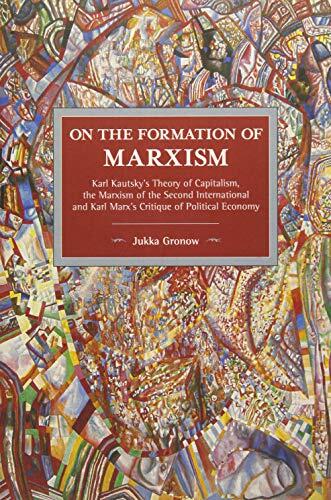
On the Formation of Marxism: Karl Kautskys Theory of Capitalism, the Marxism of the Second International and Karl Marxs Critique of Political Economy
par
Jukka Gronow
Pas encore d'évaluations
Action & Adventure
Format
Broché
Pages
344
Langue
Anglais
Publié
May 16, 2017
Éditeur
Haymarket Books
Édition
Reprint
ISBN-10
1608467031
ISBN-13
9781608467037
Description
Jukka Gronow delves into the intricate development of Marxist theory through the lens of Karl Kautsky’s perspectives on capitalism, providing a comprehensive understanding of how Marxism evolved during the era of the Second International. By meticulously examining Kautsky’s contributions, Gronow illuminates the convergence of Marxist philosophy and the political movements of the early 20th century, revealing how Kautsky intertwined Marx’s critiques with the socio-economic realities of his time.
The book offers a thorough exploration of the tensions and adaptations within Marxist thought as various factions interpreted Marx’s arguments to address contemporary issues. Gronow’s analysis highlights Kautsky’s role as a pivotal figure in shaping Marxist doctrine, balancing fidelity to Marx's original works while simultaneously adapting his theories to meet the demands of changing political landscapes.
Through this scholarly work, readers gain a nuanced appreciation of the complexities surrounding the formation of Marxism, showcasing how theoretical frameworks evolve in response to historical contexts. Gronow’s insights not only provide a historical overview but also encourage further reflection on the relevance of Marxist critique in modern economic discourse.
The book offers a thorough exploration of the tensions and adaptations within Marxist thought as various factions interpreted Marx’s arguments to address contemporary issues. Gronow’s analysis highlights Kautsky’s role as a pivotal figure in shaping Marxist doctrine, balancing fidelity to Marx's original works while simultaneously adapting his theories to meet the demands of changing political landscapes.
Through this scholarly work, readers gain a nuanced appreciation of the complexities surrounding the formation of Marxism, showcasing how theoretical frameworks evolve in response to historical contexts. Gronow’s insights not only provide a historical overview but also encourage further reflection on the relevance of Marxist critique in modern economic discourse.
Avis
Aucun avis pour le moment
Soyez le premier à donner votre avis sur ce livre et partagez vos pensées
Ajouter le premier avisJournal de lecture
Aucun journal de lecture trouvé
Commencez à suivre vos progrès de lecture pour voir les journaux ici
Ajoutez votre premier journal de lectureNotes
Journal des transactions
Aucun journal de transactions trouvé
Commencez à suivre vos transactions de livres pour voir les journaux ici
Ajoutez votre premier journal de transactions